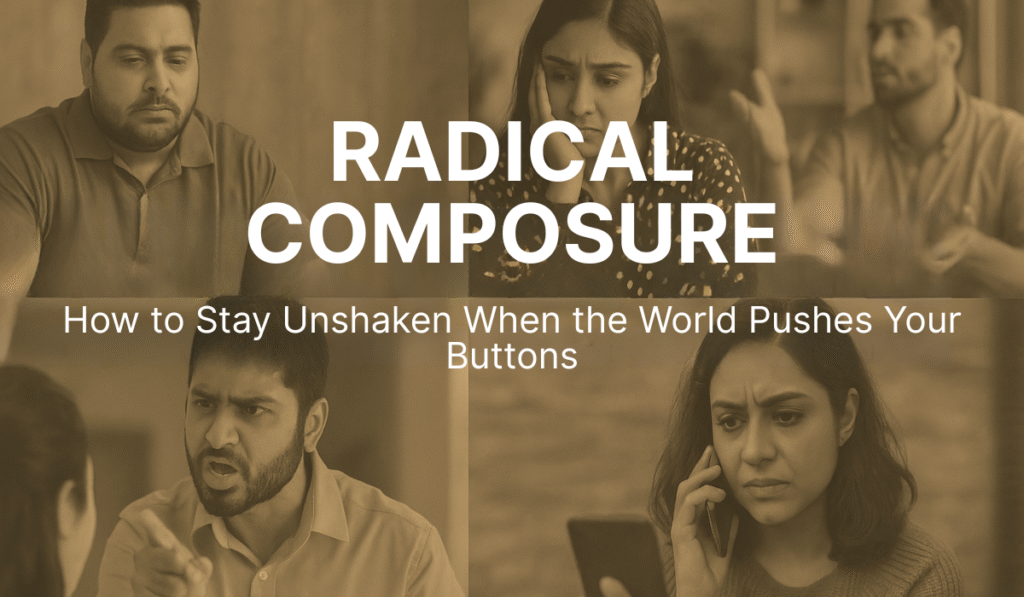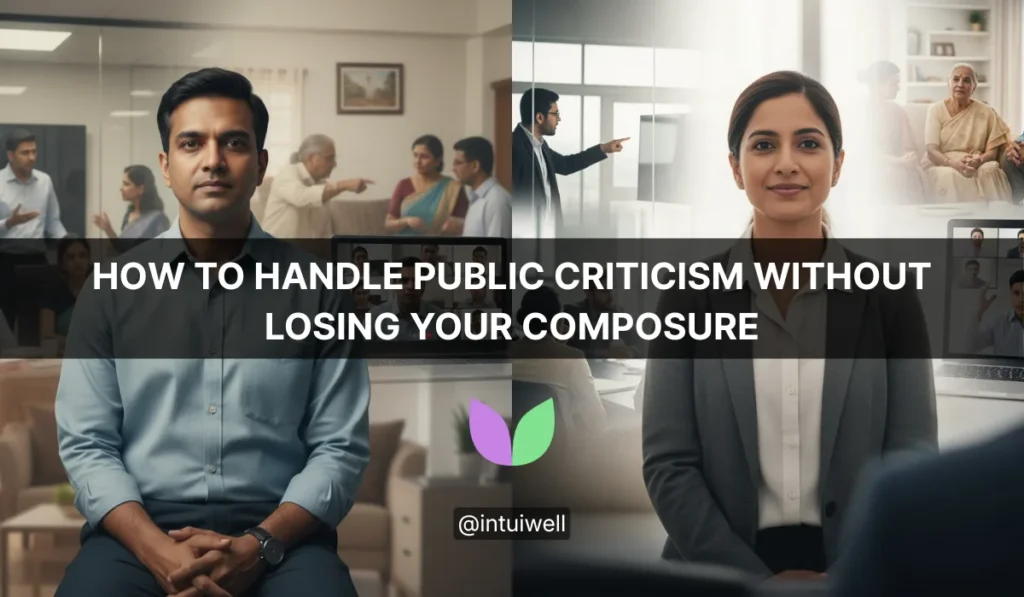When Recognition Turns Into Frustration
You worked late nights.
Solved the impossible problem.
Carried the team quietly.
Then, in the meeting, your colleague repeats your idea as if it were theirs.
The room nods.
Your manager praises them.
And you sit there — silent, boiling inside.
It’s not just about credit.
It’s about fairness. Visibility. Respect.
You want to speak up — but anger risks your composure.
You stay quiet — but resentment builds.
This is where Radical Composure separates responders from reactors.
Why Do Colleagues Take Credit for Your Work?
Understanding the psychology behind credit theft turns offense into insight.
It moves you from emotionally hijacked to strategically centered.
1. They’re Chasing Validation
Self-Determination Theory (Deci & Ryan, 1985) explains that humans crave recognition.
Some earn it. Others hijack it.
When people lack confidence, they borrow credibility from others.
Their theft isn’t about you — it’s about their insecurity.
2. They Play for Optics, Not Outcomes
In high-visibility environments, perception often outruns performance.
Some people master self-promotion, but struggle with execution.
They seek the appearance of contribution, not the responsibility that comes with it.
Understand this, and you stop taking it personally.
3. The System Rewards Loud, Not Right
Organizations often promote visibility over value.
That’s not fair — but it’s real.
Radical Composure helps you operate above it — mastering the politics without losing your integrity.
Why It Hurts So Much
Credit theft hits three psychological needs that drive workplace trust and motivation:
- Autonomy — control over your own contribution
- Competence — acknowledgment of your skill
- Relatedness — respect within your professional tribe
When these are violated, your nervous system reads it as a social threat.
That’s why your body tenses, your heart races, and your mind replays the moment on loop.
Composure helps you reclaim control — both mentally and visibly.
Radical Composure Response Playbook
These five steps blend emotional regulation with practical power moves — so you protect your dignity and your influence.
Step 1: Pause the Emotional Spike
When credit theft happens, the first instinct is to react. Don’t.
Take two slow breaths.
That pause stops the amygdala hijack and reactivates your prefrontal cortex — your decision-making center.
You can’t influence a room from a reactive state.
Control begins with stillness.
Step 2: Reclaim the Narrative — Tactfully and Publicly
You don’t need to “call them out.” You just need to re-center the truth.
Option A: Clarify in Real Time
“Glad this idea’s resonating. When I outlined it in last week’s sync, I was focused on how we could scale it further. Here’s what I’ve refined since then…”
You’ve just:
– Reclaimed ownership
– Advanced the idea
– Stayed constructive
Option B: Follow Up Privately
“Hey, I noticed you mentioned my idea in the meeting. Let’s make sure both our contributions are clear next time — keeps alignment easier.”
It’s assertive, professional, and neutral.
You’re setting a boundary without bitterness.
Step 3: Document — Don’t Dwell
Facts are your best defense.
Keep written proof of your work — notes, drafts, updates, or email summaries.
This isn’t paranoia. It’s professional hygiene.
When needed, use this documentation calmly with your manager:
“Here’s the background I led for that project — might be useful for context in reviews.”
Evidence speaks louder than emotion.
Step 4: Refocus Your Energy
Anger is energy. Don’t waste it replaying the moment — convert it into momentum.
Be visible. Send pre-reads. Lead updates.
Example: If they present your idea, volunteer to lead the implementation next — visibility follows ownership.
Your consistency will outlast their shortcuts.
Step 5: Anchor in Purpose, Not Ego
Ask yourself:
“Do I want to win this moment — or win this career?”
Radical Composure isn’t about silence; it’s about selective power.
When others scramble for applause, you’re building reputation equity.
That’s leadership currency.
Micro-Action for the Week
Before your next high-stakes meeting:
Send a brief pre-read summarizing your ideas, key data points, and proposed next steps — and include relevant stakeholders.
This simple act does three things:
1. Establishes authorship
2. Builds transparency
3. Prevents misattribution
Visibility isn’t vanity — it’s strategy.
Remember This
You can’t control who’s loud.
You can control who’s steady.
Radical Composure doesn’t mean you let things slide.
It means you handle them with precision, not emotion.
When others chase validation, you protect value.
And when others react, you lead.
“When someone takes credit for your work, don’t chase validation.
Lead with calm precision. That’s Radical Composure in action.”
Coming Next
How to Handle Public Criticism Without Losing Your Composure
The next Radical Composure Playbook drops soon.
Train in Radical Composure
Radical Composure isn’t just a mindset — it’s a trainable skill.
Learn how to master emotional control, communication, and inner balance with IntuiWell’s Transform You: Personal Growth Program.
Summary: How to Respond When a Colleague Takes Credit for Your Work
In every career, moments arise when recognition turns into frustration — when your ideas are echoed by someone else, and they get the credit. This article from IntuiWell’s Radical Composure series teaches how to turn that emotional spike into strategic strength.
When colleagues take credit for your work, it often stems from insecurity, image management, or systems that reward visibility over value. While unfair, these dynamics are common — and emotional composure becomes your competitive advantage.
The guide offers a five-step Radical Composure Playbook to respond with calm precision rather than reactive emotion:
- Pause the Emotional Spike – Breathe before reacting to regain control.
- Reclaim the Narrative (Tactfully) – Clarify authorship without confrontation, either in the moment or privately.
- Document, Don’t Dwell – Keep evidence of your contributions to protect your credibility.
- Refocus Your Energy – Channel frustration into visibility, leadership, and follow-through.
- Anchor in Purpose, Not Ego – Play the long game of influence over the short win of validation.
The article emphasizes that Radical Composure is not about suppressing emotion — it’s about transforming emotional charge into deliberate power.
The Micro-Action for the Week encourages professionals to send pre-meeting summaries to establish authorship and prevent misattribution.
Ultimately, Radical Composure means choosing precision over reaction, value over validation, and leadership over ego.
💬 FAQs
1. What is Radical Composure?
Radical Composure is the ability to remain emotionally centered and strategically effective, even under stress or unfair situations. It’s about responding with control, not reacting with emotion.
2. Why do colleagues take credit for someone else’s work?
Usually, it stems from insecurity, a desire for validation, or a culture that rewards visibility over genuine contribution. Recognizing this helps you depersonalize the event and respond more intelligently.
3. Should I confront the colleague who took credit?
Yes — but tactfully. You can address it calmly during the meeting (“Glad this idea’s resonating — I was exploring this in last week’s sync…”) or follow up privately to clarify contributions without creating hostility.
4. How can I prevent credit theft in the future?
Use documentation and proactive communication:
- Send pre-meeting summaries or follow-up emails.
- Keep track of your contributions.
- Build visibility with consistency, not confrontation.
5. What if my manager doesn’t notice or intervene?
Provide evidence-based updates to your manager. Use data, progress notes, or timelines to show your leadership without sounding defensive. Managers respect professionals who bring clarity, not complaints.
6. Isn’t staying composed the same as staying silent?
Not at all. Composure isn’t silence, it’s strategy. You’re not avoiding the issue; you’re addressing it from a position of calm power rather than emotional reactivity.
7. How can I train myself to stay composed in the moment?
Practice breathing techniques, mental reframing, and prepared responses before meetings. IntuiWell’s Transform You: Personal Growth Program teaches practical tools to build lasting emotional control and confidence.
8. What’s the key takeaway from this guide?
When someone takes credit for your work, don’t chase recognition.
Reclaim your narrative calmly. Build visibility strategically. Lead with precision.
That’s Radical Composure in action.



